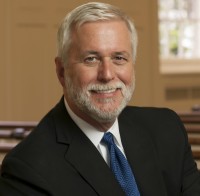Sheep on the run: Psalm 23
The 23rd Psalm has led us in the paths of comfort all the days of our lives. But sometimes we have trouble hearing the things that are closest to us. Psalm 23 was a cherished hymn for the Hebrews. So when we read and sing the psalms as Christians, we are to some degree also in Jewish territory. It is wise to remember the nature of the Jews’ history with God.
They were a people who were called Israel, which means, “those who have struggled with God.” They struggled for a home that they were always trying to get into, hold onto or get back to. They struggled for peace, for food and for a future. Most important, they struggled for their faith in God.
The Hebrews longed to live with God as sheep live with a shepherd, but their life was hard. And they were too afraid to keep believing that this Shepherd was leading them to green pastures, or that goodness and mercy would always follow them. So they frequently rushed down more promising paths toward more manageable gods, which always led them into unmanageable trouble and laments for the salvation of God. Then they would return to worship, where this story was told and retold.
So it is not surprising that so many of the psalms describe the churning, disruptive experience of being lost and found, judged and forgiven, sent away and brought back. It is all a part of the pathos of people who got scared and lost their way, and of the high drama of a God who searches to find his lost sheep.
This means that the last thing we ought to be doing is rushing to the 23rd Psalm to be reminded that everything is OK. We’re drawn to the images of green pastures, still waters and an overflowing cup because we strive for equilibrium, security and abundance. We don’t particularly care for the highs and lows of Israel’s history, the people’s insatiable thirst on long desert journeys, or their maddening love affair with God. It all sounds a bit reckless.
Besides, most of us can make it to the green pastures on our own. Of course, they are never quite green enough, but that only makes us work harder to be our own saviors. And more terrified that we will never pull it off.
Have you ever been really scared? Maybe it took a disease to scare you, a notice that your job had been eliminated, a phone call from the police late at night, or a letter on a kitchen counter that said, “I’m not coming back.” We speak sometimes of being scared stiff or paralyzed with fear, but as a pastor I’ve seen that most people react to fear by running like crazy. It doesn’t matter where they run or what they try next. They just have to keep moving. The late psychologist Rollo May has written, “Humans are the strangest of all of God’s creatures, because they run fastest when they have lost their way.”
This is how we get into real trouble—by running when we are lost. It is then that we make the worst mistakes with relationships, family and work. The same could be said of churches, schools and governments. Not convinced that the Lord is leading us to green pastures, we veer off course, try a short cut or run like terrified sheep.
I don’t mind calling the Lord my Shepherd, but I’ve never been too flattered by being called one of his sheep. I had hoped to be the eagle of the Lord, or maybe the cunning tiger. Sheep aren’t particularly smart. They scare easily, and have a knack for getting lost. Most of us don’t look lost. We haven’t fallen through society’s cracks into homelessness and poverty. But David would say, “Oh no. It is you who have lost your way in a relationship that’s offered more hurt than love, in a job that leaves you depleted and spent, or in the guilt of not being good enough, pretty enough or smart enough for someone whose judgment cuts deep.”
Some of us have gotten lost in our battles against declining health. Others are lost in grief. And how many of us are just simply lost in our shame for things done and left undone? Trying so hard to find ourselves, we’ve even lost sight of who we are, who we were created to be.
The reason both the psalmist and Jesus spent so much time describing us as lost was not to judge us, but to help us find our salvation. Confessing that we are frightened and lost is the first step.
The key to discovering this salvation is seeing that “Thou art with me.” That is how David survived the valley of the shadow of death when he was on the run from Saul, and it is the hope that rises out of the rubble of collapsed towers in New York. Believing God is with us is how relief workers make it through another day of caring for the homeless in Afghanistan, and how huddled Christians continue to worship in countries where the church is persecuted. It is even how middle-class Americans survive jobs they don’t like but can’t afford to leave because they need them to support lifestyles they don’t really like . . .
There it is again—the churning, disruptive experiences of a people who keep discovering that their only hope is in the Shepherd who is always the closest thing to them.






